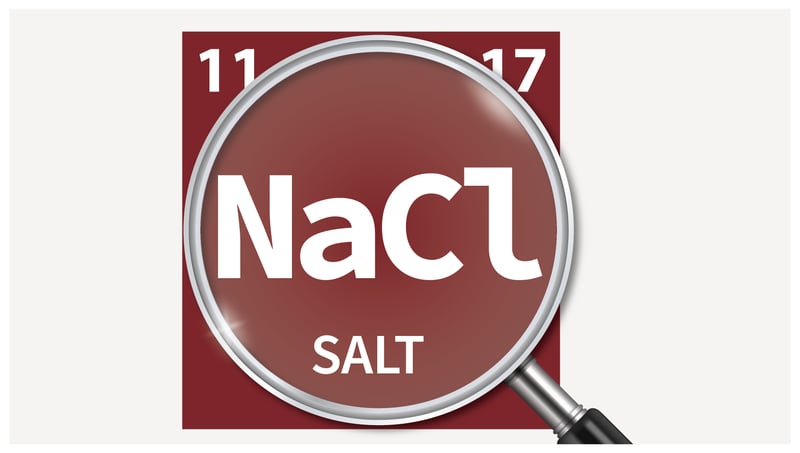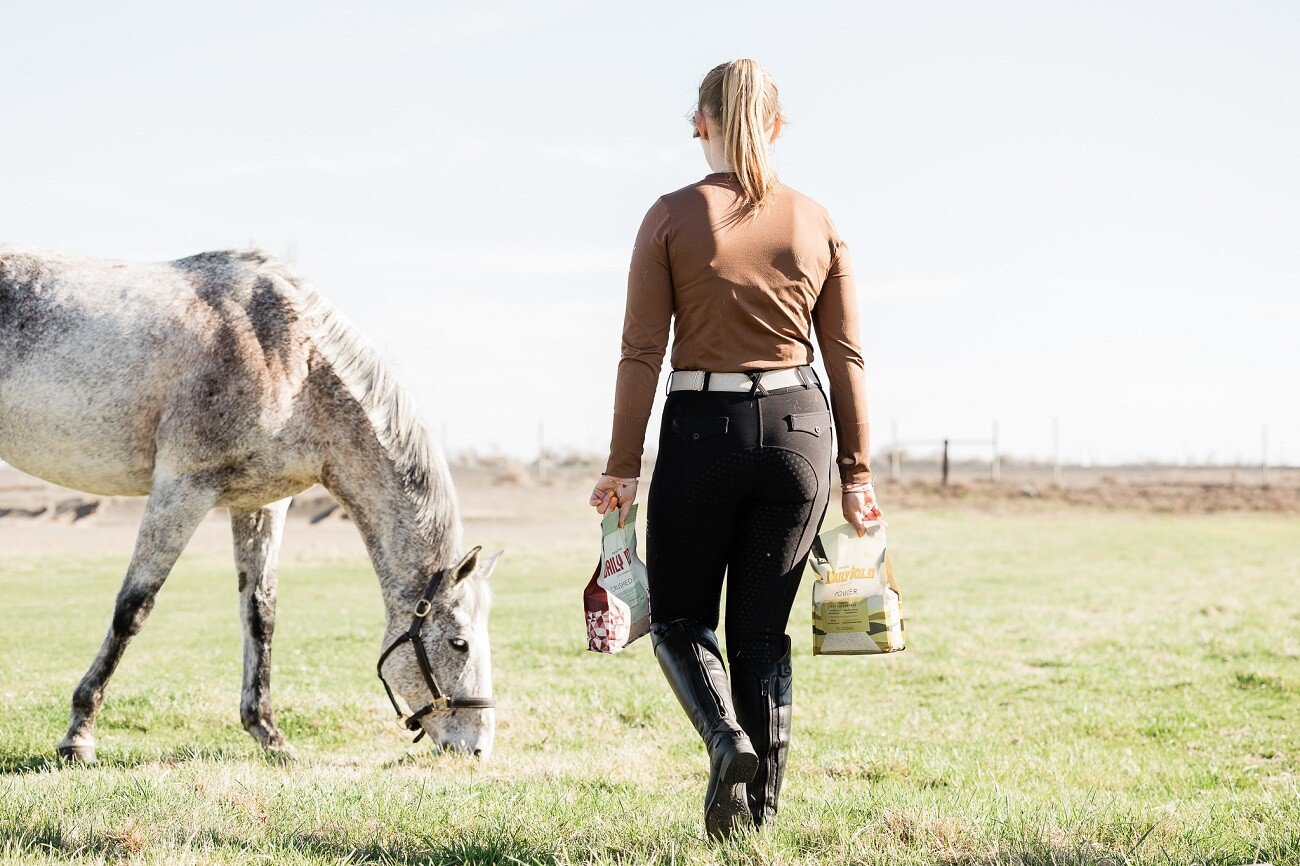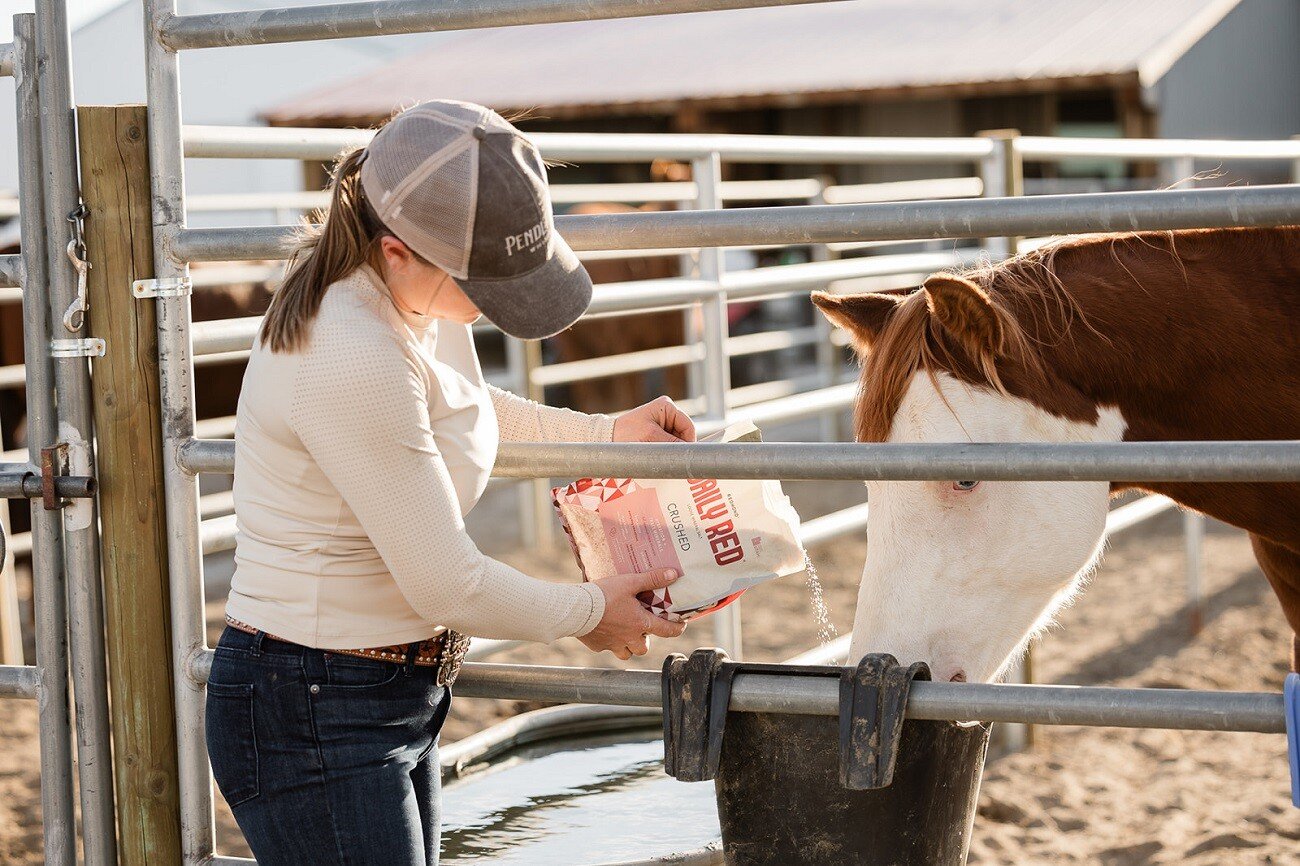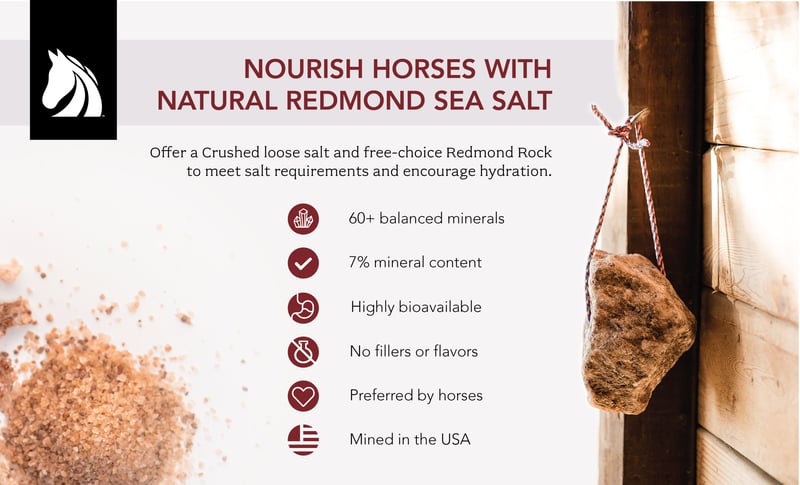How Much Salt to Feed Horses to Prevent Deficiency & Toxicity
October 23, 2023
How Much Salt to Feed Horses to Prevent Deficiency & Toxicity
As horse owners, we strive to provide our partners with the best care possible. But when it comes to feeding, one essential yet often overlooked component is salt.
While it may seem like a simple addition to a horse’s diet, the correct amount of salt plays a crucial role in maintaining hydration, health, and performance.
In this blog, we explore why horses need salt. Then cover the recommended daily intake and factors to consider when figuring out how much salt your horse needs to live a healthy life.
Is Salt Good for Horses?
The question really isn’t whether salt is good for horses, but rather how much is good. Salt is not produced by the body but is absolutely necessary for life. In fact, salt is the most crucial mineral horses require!
Since hay and pasture grasses contain very little salt, your horse should have access to a quality salt supplement every day. Let's talk about how much salt horses need daily and what happens if they get too little or too much.

What Happens if Horses Don't Get Enough Salt?
So, why do horses need salt anyway? Salt (NaCl) consists of two minerals: sodium and chloride. Sodium is necessary for proper muscle contraction, including the heart, as well as nerve impulses throughout the body and brain. It also helps trigger the thirst mechanism.
Chloride helps balance blood pH and assists potassium regulation, allowing for proper muscle contraction, water balance, and stomach acid production.
Symptoms of Salt Deficiency in Horses
Salt deficiency is much more common in horses than salt poisoning. Without a salt supplement, some horses won’t consume enough water and risk becoming dehydrated—which can lead to colic impaction and other life-threatening problems. The Merck Vet Manual notes horses that do not receive adequate daily salt may:
- Tire easily
- Stop sweating
- Exhibit muscle spasms if exercised strenuously
- Lose weight
- Experience pica (learn more reasons why horses eat dirt)
- Have decreased milk production in lactating mares
Salt Toxicity in Horses—It Happens, but Rarely
Most horses will self-regulate and consume only as much salt as they need. And salt is water-soluble, so horses naturally balance intake by drinking water to flush out any excess.
But can a horse lick too much salt? The answer is yes—though it’s rare. If salt toxicity (also known as salt poisoning or hypernatremia) does occur, it's usually because a horse increases salt intake and stops drinking or is denied access to water.
The Merck Vet Manual notes: "In general, animals can tolerate high concentrations of salt or sodium in the diet if they have continuous access to fresh water. Salt poisoning is often directly related to water consumption and can be reduced significantly or abolished completely by appropriate management of factors such as mechanical failure of waterers, overcrowding, unpalatable medicated water, new surroundings, or frozen water sources."
Though these situations are uncommon, salt poisoning can also occur if horses:
- Consume salty drinking water (livestock water should contain less than 0.5% total salt)
- Drink water that has accumulated in salt lick containers
- Spend an unusual amount of time licking or chewing salt blocks (more likely to happen with bored horses)
Symptoms of a Horse Eating Too Much Salt
As mentioned, salt poisoning shouldn’t happen if a horse's sodium-regulating mechanisms are intact and fresh drinking water is available. However, occasionally you may come across a horse that simply has a large appetite for salt. If you suspect your horse is getting too much, these are symptoms to watch for:
- Colic
- Diarrhea or loose manure
- Drinking too much water
- Frequent urination
- General weakness
Treating & Preventing Salt Poisoning in Horses
First, you should seek your vet's advice on how to treat and manage salt poisoning if you suspect your horse has been affected. However, offering small amounts of fresh water frequently will usually flush out excesses and rehydrate most horses within two or three days.
But what about those rare salt-aholic horses that continue to consume too much? It's easy to decrease intake in horses with excessive salt appetites. Here are three simple solutions.
Combat Boredom
Eating too much salt can be a sign of boredom. To combat it, ensure your horse gets adequate exercise and time to roam. Turnout time entertains and helps horses find other ways to satisfy their natural impulse to chew. Adding a toy or enrichment to their stall may also decrease the overuse of salt licks.
Make Water Available
Provide horses with constant access to fresh water. This is critical. Salt triggers thirst response and encourages horses to drink. Sufficient water consumption also flushes out any excess salt a horse consumes but doesn't need. A horse that's not drinking is much more likely to experience salt toxicity. Learn how to get horses to drink more.
Feed Loose Salt
If your horse spends too much time with a salt lick, consider removing it and instead adding loose salt to feed. Loose mineral sea salt takes the guesswork out of how much salt to feed a horse. It can be top-dressed on feed or given free-choice in a pan. Either way, you get to control how much your horse consumes each day.
How Much Salt to Feed a Horse Daily
So how much salt do horses require daily to avoid both salt deficiencies and overconsumption? In Nutrient Requirements of Horses, the National Research Council suggests an average 1,100-lb horse at rest needs at least 25 grams of salt per day as a maintenance dose. That's approximately 1.5 tablespoons or .75 ounces of loose salt. It’s important to note, however, that requirement increases significantly—up to 200 grams—for horses involved in moderate to heavy exercise.
How to Feed Salt to Horses
So how much salt does your horse need per day? At Redmond, we recommend a straightforward approach for most active horses. Here's how you can ensure your horse gets the right amount of salt:
- Top-Dress Loose Salt: For an average 1,100-lb horse, add 2 to 4 tablespoons of a Daily Red loose mineral salt to your horse’s daily feed. Adjust the serving up or down based on activity levels and sweat production.
- Offer a Free-Choice Lick: Provide a Redmond Rock to meet any additional salt needs. Or if your horse tends to overindulge in salt, hold the rock and feed only the daily requirement of loose salt.
We hope we've answered your important questions about how much salt to give a horse! By following these simple steps, you can confidently meet your horse's salt needs. Click below to peruse and purchase natural Redmond salt products today.
Learn More
- Debunk four common myths about horse salt licks and blocks.
- Find out whether rock salt or mineral blocks are right for your horse.
© Redmond Equine 2023. All rights reserved.
Related posts

Loose Minerals Helped Shanon's Rescue Horse | A Redmond Story
Many horses are deficient in critical trace minerals. Redmond Rock natural salt lick and loose minerals provide horses the minerals they need for...
December 18, 2024

Why Shelby Switched to Loose Horse Minerals | A Redmond Story
Horses may ignore salt blocks and become dehydrated. Redmond Rock Crushed loose mineral salt provides needed trace minerals and electrolytes for...




